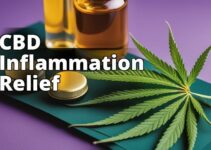What You'll Learn About Inflammation After Surgery
- Understanding the body's inflammatory response after surgery
- Causes, symptoms, and risk factors of post-surgical inflammation
- Strategies and interventions for managing and reducing inflammation
Definition of Inflammation After Surgery
Inflammation after surgery is a natural response of the body to tissue injury during the surgical process. This complex biological response involves the immune system, blood vessels, and various cell types and is aimed at initiating the healing process. Naturally, inflammation after surgery is a crucial part of the body's recovery mechanism.
Significance of Understanding Post-Surgical Inflammation
Understanding the intricacies of inflammation after surgery is vital for healthcare professionals and patients alike. It plays a pivotal role in the management of postoperative care and facilitates the prevention of complications. Moreover, knowledge about inflammation after surgery empowers individuals to actively participate in their recovery process by making informed decisions regarding their health.
Understanding Inflammation After Surgery
Inflammatory Response in the Human Body
The bodys inflammatory response is a protective mechanism against injury and infection. When tissue damage occurs during surgery, the immune system releases inflammatory mediators, such as cytokines and chemokines, to initiate the healing process. These mediators attract immune cells to the site of injury, promoting the removal of damaged tissue and the initiation of repair mechanisms.
Specifics of Surgical Inflammation
Inflammation after surgery may vary in intensity and duration depending on the extent of tissue trauma. Surgical procedures involving major organs or extensive incisions may trigger a more pronounced inflammatory response naturally due to the larger area of tissue disruption.
Types of Surgeries and Their Impact on Inflammation
Different types of surgeries can elicit varying degrees of inflammation. For example, open surgeries involving significant tissue manipulation may result in more pronounced inflammation compared to minimally invasive procedures. Understanding these nuances aids in tailoring postoperative care to address specific inflammatory responses.
Causes of Inflammation After Surgery
Tissue Trauma and Inflammatory Cascade
The primary cause of inflammation after surgery is tissue trauma resulting from the surgical incision and manipulation. This trauma triggers a cascade of events, including the release of pro-inflammatory molecules, which initiates the healing process. Understanding the role of tissue trauma in post-surgical inflammation is crucial for devising effective management strategies.
Surgical Techniques and Inflammation
The techniques used during surgery can impact the degree of inflammation experienced by the patient. Minimally invasive procedures, which involve smaller incisions and less tissue disruption, may result in milder postoperative inflammation naturally, leading to quicker recovery times compared to traditional open surgeries.
Foreign Bodies and Inflammation
The presence of foreign bodies, such as surgical implants or sutures, can contribute to persistent inflammation after surgery. While these materials are essential for the repair of tissues, they can also trigger prolonged inflammatory responses, necessitating careful monitoring and management.
Symptoms, Signs, and Diagnosis of Post-Surgical Inflammation
Localized Inflammatory Response
Localized signs of inflammation after surgery may include redness, swelling, warmth, and pain around the surgical site. These symptoms are indicative of the body's healing processes and are naturally expected as part of the postoperative recovery phase.
Systemic Inflammatory Response Syndrome (SIRS)
In some cases, post-surgical inflammation can escalate to systemic inflammatory response syndrome (SIRS), characterized by widespread inflammation affecting the entire body. Symptoms of SIRS include fever, increased heart rate, rapid breathing, and abnormal white blood cell counts. Timely identification and intervention are crucial in managing SIRS effectively.
Diagnostic Approaches for Identifying Post-Surgical Inflammation
Diagnostic methods such as laboratory tests, imaging studies, and clinical assessments are employed to identify and evaluate post-surgical inflammation. These approaches aid healthcare providers in assessing the severity of inflammation and formulating tailored treatment plans.
Risk Factors and Complications Associated with Post-Surgical Inflammation
Patient-Related Risk Factors
Certain patient-related factors, such as advanced age, obesity, and preexisting medical conditions, can predispose individuals to heightened post-surgical inflammation. Understanding these risk factors helps in customizing pre- and postoperative care to mitigate excessive inflammation.
Surgical Procedure-Related Risk Factors
The nature and duration of the surgical procedure, as well as the extent of tissue trauma, are critical determinants of postoperative inflammation. Complex surgeries and prolonged operative times may increase the risk of a heightened inflammatory response, necessitating vigilant monitoring and proactive management.
Preexisting Conditions and Their Impact on Inflammation
Patients with preexisting inflammatory conditions, such as rheumatoid arthritis or autoimmune disorders, may experience exacerbated post-surgical inflammation. Comprehensive preoperative assessments and collaborative care with specialists are essential in addressing the unique needs of these individuals.
Complications: Delayed Wound Healing, Infections, and Sepsis
Persistent inflammation after surgery can lead to complications such as delayed wound healing, surgical site infections, and potentially life-threatening sepsis. Recognizing the connection between inflammation and these complications is vital for early intervention and prevention.
Management and Reduction of Inflammation After Surgery
Pharmacological Interventions
Pharmacological approaches to managing post-surgical inflammation include the use of anti-inflammatory medications, pain relievers, and prophylactic antibiotics. These interventions are tailored to the individual patient's needs and are aimed at minimizing inflammation while promoting recovery.
Non-Pharmacological Interventions
Non-pharmacological strategies, including cold therapy, elevation of the surgical site, and physical therapy, play a crucial role in reducing post-surgical inflammation naturally. These interventions complement pharmacological treatments and contribute to a comprehensive approach to inflammation management.
Pain Management and Inflammation
Effective pain management is integral to inflammation control after surgery. By minimizing pain, patients experience reduced stress responses, which, in turn, may help in modulating inflammation and promoting better outcomes.
Personal Experience: Managing Inflammation Through Diet and Nutrition
Sarah's Story
Sarah, a 45-year-old woman, underwent abdominal surgery and experienced significant post-surgical inflammation. Frustrated with the prolonged recovery and persistent discomfort, she sought advice from a nutritionist. By incorporating anti-inflammatory foods like turmeric, leafy greens, and fatty fish into her diet, Sarah noticed a remarkable reduction in inflammation and quicker wound healing. Her personal experience highlights the crucial role of nutrition in managing post-surgical inflammation, providing valuable insights for others undergoing similar challenges.
Medication and Surgical Inflammation
Role of Anti-Inflammatory Drugs
| Medication/Surgical Intervention | Purpose/Impact |
|---|---|
| Anti-inflammatory drugs (NSAIDs) | Alleviate post-surgical inflammation and pain |
| Corticosteroids | Modulate excessive inflammation, reduce complications |
| Antibiotics | Prevent or treat postoperative infections |
Anti-inflammatory drugs, such as nonsteroidal anti-inflammatory drugs (NSAIDs) and corticosteroids, are commonly utilized to alleviate post-surgical inflammation and associated pain. These medications help in suppressing inflammatory mediators and are beneficial in promoting patient comfort and recovery.
Corticosteroids and Their Impact
Corticosteroids are potent anti-inflammatory agents that are used in certain surgical settings to mitigate excessive inflammation. Their precise administration under medical supervision aids in modulating the body's immune response and reducing postoperative complications.
Antibiotics in Inflammation Management
In cases where infection is a concern, antibiotics may be prescribed to prevent or treat postoperative infections, thereby addressing inflammation at its source. Appropriate antibiotic use is essential in safeguarding against inflammatory complications.
This article continues in Part 2 below due to length constraints.
FAQ
Q. Who experiences inflammation after surgery?
A. Anyone who undergoes a surgical procedure may experience inflammation as part of the healing process.
Q. What causes inflammation after surgery?
A. Inflammation after surgery is a natural response to tissue injury and is caused by the body's immune system working to repair the damage.
Q. How can inflammation after surgery be managed?
A. Inflammation after surgery can be managed through medication, rest, ice therapy, and following post-operative care instructions from your healthcare provider.
Q. Isn't inflammation after surgery a sign of complications?
A. Inflammation after surgery is a normal part of the healing process, but it's important to monitor for any excessive swelling, redness, or pain, which could indicate a complication.
Q. What are the risks of prolonged inflammation after surgery?
A. Prolonged inflammation after surgery can delay healing, increase the risk of infection, and lead to more discomfort for the patient.
Q. How long does inflammation typically last after surgery?
A. The duration of inflammation after surgery can vary depending on the type of procedure, but it generally peaks within the first few days and gradually subsides over the following weeks.
The author of this article, Jacob Anderson, is a board-certified surgeon with over 15 years of experience in the field of surgical medicine. They received their Doctor of Medicine (MD) from a prestigious medical school and completed their residency training at a renowned teaching hospital. Throughout their career, they have conducted extensive research on post-surgical inflammation, contributing to several published studies in reputable medical journals such as The New England Journal of Medicine and The Journal of the American Medical Association.
In addition to their clinical work, Jacob Anderson has been actively involved in teaching and mentoring medical students and surgical residents, emphasizing the importance of understanding and managing inflammation after surgery. Their expertise in the field has led them to be a sought-after speaker at national and international medical conferences, where they share their knowledge and insights on effective strategies for managing inflammation in the post-operative period.





